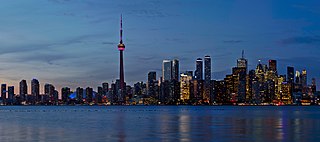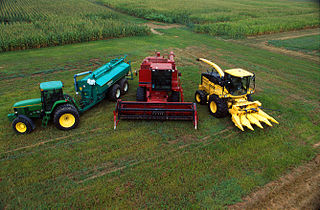
The economy of Canada is a highly developed mixed economy, the world's ninth-largest as of 2024, and a nominal GDP of approximately US$2.117 trillion. Canada is one of the world's largest trading nations, with a highly globalized economy. In 2021, Canadian trade in goods and services reached $2.016 trillion. Canada's exports totalled over $637 billion, while its imported goods were worth over $631 billion, of which approximately $391 billion originated from the United States. In 2018, Canada had a trade deficit in goods of $22 billion and a trade deficit in services of $25 billion. The Toronto Stock Exchange is the tenth-largest stock exchange in the world by market capitalization, listing over 1,500 companies with a combined market capitalization of over US$3 trillion.
International trade is the exchange of capital, goods, and services across international borders or territories because there is a need or want of goods or services.

The World Trade Organization (WTO) is an intergovernmental organization headquartered in Geneva, Switzerland that regulates and facilitates international trade. Governments use the organization to establish, revise, and enforce the rules that govern international trade in cooperation with the United Nations System. The WTO is the world's largest international economic organization, with 166 members representing over 98% of global trade and global GDP.
A tariff is a tax imposed by the government of a country or by a supranational union on imports or exports of goods. Besides being a source of revenue for the government, import duties can also be a form of regulation of foreign trade and policy that taxes foreign products to encourage or safeguard domestic industry. Protective tariffs are among the most widely used instruments of protectionism, along with import quotas and export quotas and other non-tariff barriers to trade.
A subsidy, subvention or government incentive is a type of government expenditure for individuals and households, as well as businesses with the aim of stabilizing the economy. It ensures that individuals and households are viable by having access to essential goods and services while giving businesses the opportunity to stay afloat and/or competitive. Subsidies not only promote long term economic stability but also help governments to respond to economic shocks during a recession or in response to unforeseen shocks, such as the COVID-19 pandemic.

Protectionism, sometimes referred to as trade protectionism, is the economic policy of restricting imports from other countries through methods such as tariffs on imported goods, import quotas, and a variety of other government regulations. Proponents argue that protectionist policies shield the producers, businesses, and workers of the import-competing sector in the country from foreign competitors and raise government revenue. Opponents argue that protectionist policies reduce trade, and adversely affect consumers in general as well as the producers and workers in export sectors, both in the country implementing protectionist policies and in the countries against which the protections are implemented.

Agricultural policy describes a set of laws relating to domestic agriculture and imports of foreign agricultural products. Governments usually implement agricultural policies with the goal of achieving a specific outcome in the domestic agricultural product markets. Well designed agricultural policies use predetermined goals, objectives and pathways set by an individual or government for the purpose of achieving a specified outcome, for the benefit of the individual(s), society and the nations' economy at large. The goals could include issues such as biosecurity, food security, rural poverty reduction or increasing economic value through cash crop or improved food distribution or food processing.

An agricultural subsidy is a government incentive paid to agribusinesses, agricultural organizations and farms to supplement their income, manage the supply of agricultural commodities, and influence the cost and supply of such commodities.
Dumping, in economics, is a form of predatory pricing, especially in the context of international trade. It occurs when manufacturers export a product to another country at a price below the normal price with an injuring effect. The objective of dumping is to increase market share in a foreign market by driving out competition and thereby create a monopoly situation where the exporter will be able to unilaterally dictate price and quality of the product. Trade treaties might include mechanisms to alleviate problems related to dumping, such as countervailing duty penalties and anti-dumping statutes.
An export in international trade is a good produced in one country that is sold into another country or a service provided in one country for a national or resident of another country. The seller of such goods or the service provider is an exporter; the foreign buyers is an importer. Services that figure in international trade include financial, accounting and other professional services, tourism, education as well as intellectual property rights.

Non-tariff barriers to trade are trade barriers that restrict imports or exports of goods or services through mechanisms other than the simple imposition of tariffs. Such barriers are subject to controversy and debate, as they may comply with international rules on trade yet serve protectionist purposes.
Trade can be a key factor in economic development. The prudent use of trade can boost a country's development and create absolute gains for the trading partners involved. Trade has been touted as an important tool in the path to development by prominent economists. However trade may not be a panacea for development as important questions surrounding how free trade really is and the harm trade can cause domestic infant industries to come into play.
The Doha Development Round or Doha Development Agenda (DDA) is the trade-negotiation round of the World Trade Organization (WTO) which commenced in November 2001 under then director-general Mike Moore. Its objective was to lower trade barriers around the world, and thus increase global trade.
The Agreement on Agriculture (AoA) is an international treaty of the World Trade Organization. It was negotiated during the Uruguay Round of the General Agreement on Tariffs and Trade, and entered into force with the establishment of the WTO on 1 January 1995.
Export restrictions, or a restriction on exportation, are limitations on the quantity of goods exported to a specific country or countries by a Government. Export restrictions could be aimed at achieving diverse policy objectives such as environmental protection, economic welfare, social wellbeing, conversion of natural resources, and controlling inflationary pressures. There are various forms of restrictions on export as defined by WTO's Trade Policy Reviews (TPR), for example, export duties, quantitative restrictions, voluntary export restrictions, export prohibitions and licensing requirements. Although some countries apply export restriction of various policy purposes, restrictions on exports provide price advantage for the domestic industries because these restrictions create price difference between domestic goods compared to the price of the same goods to foreign investors. Export restrictions don't always provide benefits for the country and more income for the government. In the field of agriculture and food sector export restrictions are aimed at protecting the domestic food security from international supply. During the food crises of 2007–2008, more than thirty countries imposed various export restriction measures such as quantitative export restrictions, prohibitions, export taxes, and price controls to protect the domestic food supply. However, this created additional pressures on the food crises by imposing high global prices and affecting the supply of food in the international market.
Import certificates are a proposed mechanism to implement balanced trade, and eliminate a country's trade deficit. The idea was proposed by Warren Buffett in 2003 to address the U.S. trade deficit. In the United States, the idea was first introduced legislatively in the Balanced Trade Restoration Act of 2006. The proposed legislation was sponsored by Senators Byron Dorgan (ND) and Russell Feingold (WI), two Democrats in the United States senate. Since then there has been no action on the bill.
The Brazil–United States cotton dispute was a World Trade Organization dispute settlement case (DS267) on the issue of unfair subsidies on cotton. In 2002, Brazil—a major cotton export competitor—expressed its growing concerns about United States cotton subsidies by initiating a WTO dispute settlement case against certain features of the U.S. cotton program. On March 18, 2003, a Panel was established to adjudicate the dispute. Argentina, Canada, China, Taiwan, the European Communities, India, Pakistan, and Venezuela participated as third parties. Focusing on six specific claims relating to US payment programmes, Brazil argued that the US had failed to abide by its commitments in the Uruguay Round Agreement on Agriculture (AoA) and the Agreement on Subsidies and Countervailing Measures (SCM). On September 8, 2004, a WTO dispute settlement (DS) panel ruled against the United States on several key issues in case.

The Ministry of Commerce of Iran was the main organ of the Government in charge of the regulation and implementation of policies applicable to domestic and foreign trade. This includes:
Afghanistan received membership to the World Trade Organization (WTO) at the 10th WTO Ministerial Conference in Nairobi, Kenya, December 17, 2015. Afghanistan is 164th in the world and 36th among the less-developed countries that have received WTO membership.
A destination-based cash flow tax (DBCFT) is a cashflow tax with a destination-based border-adjustment. Unlike traditional corporate income tax, firms are able to immediately expense all capital investment. This ensures that normal profit is out of the tax base and only super-normal profits are taxed. Additionally, the destination-based border-adjustment is the same as how the Value-Added Tax treat cross-border transactions—by exempting exports but taxing imports.






